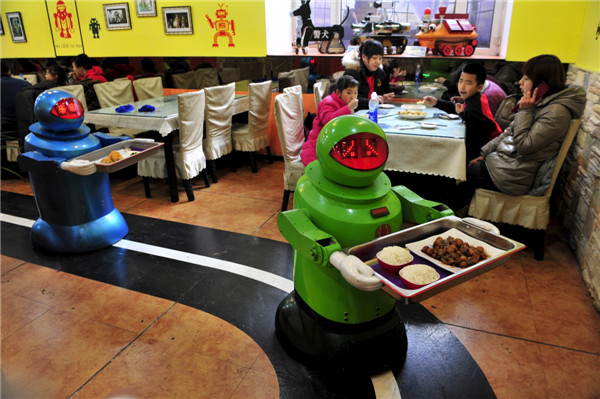Will robots replace human labor?
By Yang Yang ( China Daily ) Updated: 2015-04-25 07:31:49
 |
|
Robots deliver dishes to customers at Robot Restaurant in Harbin, Heilongjiang province. [Photo provided to China Daily] |
In the animated film Wall-E, human beings give up the Earth and live in a man-made space city, served completely by robots: driverless cars, cleaning robots, repairing robots and armed robot guards. Human beings need not work at all, but are fed like babies who cannot even walk on feet.
Real life is not so far away from movies. We already have robots that can clean floors. In Northeast China, robots take over from cooks to slice noodles. In late March, a restaurant in Beijing's Daxing district started to use robots as waiters and waitresses to cut down costs.
In the US, when protesters were calling for fast-food chains to raise wages, many restaurants were experimenting with robots to reduce employees.
In July 2014, the Associated Press started using software to help journalists to write business news faster. In early March this year, the news agency announced a new software called Wordsmith that will help generate college sports news that it had not covered before.
Once self-driving cars are put into wide use in the future, millions of taxi drivers around the world will lose their job. As robotic science and technology advance, robots will inevitably replace human beings to do more jobs. Some people are worried that the large-scale application of robots will result in an unprecedented unemployment crisis. However, scientists say there is no need to worry unduly.
In September 2013, two researchers Carl Benedikt Frey and Michael A Osborne from the University of Oxford, released a research report titled "The Future of Employment: How Susceptible Are Jobs to Computerization?"
They estimated the probability of computerization for 702 occupations and concluded that about 47 percent of total US employment is at risk.
But in an e-mail reply to China Daily, Osborne, associate professor in machine learning, says: "There will certainly be new jobs created by advances in technology, alongside the many benefits afforded to all consumers by the development of increasingly cheap and fantastic products."
"Nonetheless, our study highlights the potential risks of automation to low-skilled workers, who will likely be ill-equipped to move into the new occupations that do emerge: travel agents put out of work by web services may not be able to get jobs as data scientists," he says.
The replacement of low-skilled workers by robots seems to have started.
|
|
|
|
|
|
|
|

























 Raymond Zhou:
Raymond Zhou: Pauline D Loh:
Pauline D Loh: Hot Pot
Hot Pot Eco China
Eco China China Dream
China Dream China Face
China Face






